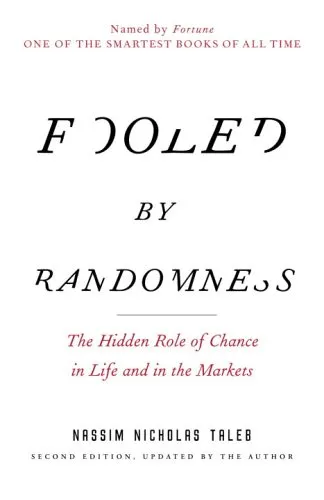Fooled by Randomness: The Hidden Role of Chance in Life and in the Markets
4.3
Reviews from our users

You Can Ask your questions from this book's AI after Login
Each download or ask from book AI costs 2 points. To earn more free points, please visit the Points Guide Page and complete some valuable actions.Introduction to "Fooled by Randomness: The Hidden Role of Chance in Life and in the Markets"
Nassim Nicholas Taleb's "Fooled by Randomness" dives deep into the profound impact that randomness and luck have on our day-to-day lives and the wider world of financial markets. Published in 2001, this book represents a foundational text for understanding the limits of human knowledge and the unpredictable nature of life.
Detailed Summary of the Book
In "Fooled by Randomness," Taleb challenges the conventional wisdom about success, randomness, risk, and uncertainty. The book begins by examining how we, as individuals and societies, frequently mistake luck for skill. Through various anecdotes and stories, Taleb illustrates how randomness plays a far greater role than we might wish to acknowledge, particularly in finance and economics but extending to all levels of decision making.
The author delves into the human brain's failings in recognizing randomness and the psychological biases that prevent us from distinguishing between chance and skillful execution. Taleb uses the story of a lucky stock trader to illustrate how people often attribute their success purely to personal ability rather than acknowledging the part that random events play in their achievements.
Throughout the book, Taleb critiques over-reliance on deterministic thinking and mathematical modeling, arguing that these often fail to account for the complexity and inherent unpredictability of real-world events. He introduces the concept of "black swans"—rare and unpredictable events with significant impact—to illustrate the limitations of our understanding.
Key Takeaways
- The Illusion of Skill: Many successes attributed to skill might largely be due to luck. It is crucial to differentiate between the two to avoid being misled by randomness.
- Survivorship Bias: We often only see the survivors or successes rather than considering all who have failed, leading to skewed perceptions of reality.
- Black Swans: Rare events can have catastrophic effects, often arriving unpredictably. Preparing for the unpredictable is better than trying to predict everything.
- Limitations of Models: Financial models and risk calculators often fail, as they cannot capture the stochastic elements of real-life scenarios.
- Cognitive Bias: Human cognition is wired with biases that make understanding probability and randomness challenging.
Famous Quotes from the Book
"The irony of the process is that the longer it goes on, the less likely you are to be right if you are indeed wrong."
"It is more random than we think. The world we live in is vastly more understudied and unpredictable than we can allow ourselves to admit."
"Any form of knowledge, including awareness of randomness, is an expansion of the possibilities considered."
Why This Book Matters
At its core, "Fooled by Randomness" is not merely about economics or financial markets. It challenges the reader to rethink how they perceive life events, success, and failure. As randomness and luck play a much more substantial role than is typically acknowledged, Taleb's book is essential for anyone involved in decision-making, investment, or any field where risk is a component.
Taleb's ideas have wide-ranging implications. By fostering awareness of the unseen effects of randomness and biases, the book encourages readers to prepare for unpredictability rather than being misled by deterministic illusions. Taleb's unique perspective is both a philosophical journey and a practical guide to living in a stochastic world.
Free Direct Download
You Can Download this book after Login
Accessing books through legal platforms and public libraries not only supports the rights of authors and publishers but also contributes to the sustainability of reading culture. Before downloading, please take a moment to consider these options.
Find this book on other platforms:
WorldCat helps you find books in libraries worldwide.
See ratings, reviews, and discussions on Goodreads.
Find and buy rare or used books on AbeBooks.
1354
بازدید4.3
امتیاز50
نظر98%
رضایتReviews:
4.3
Based on 0 users review
"کیفیت چاپ عالی بود، خیلی راضیام"
Questions & Answers
Ask questions about this book or help others by answering
No questions yet. Be the first to ask!


